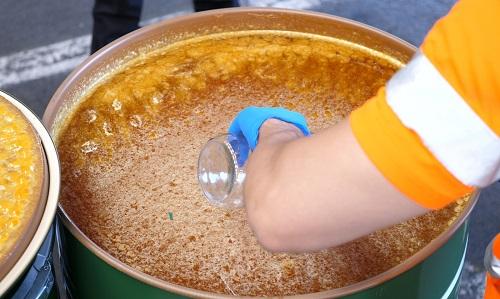
PRESS RELEASE No 3/2023
PDF version
The European Anti-Fraud Office (OLAF) provided investigative support and on-the-spot checks in an EU action against honey adulteration led by the European Commission.
‘From the hives’ – as it was dubbed – was an EU coordinated action led by the European Commission’s Directorate-General for Health and Food Safety (DG SANTE), with the national authorities of 18 countries who are part of the EU Food Fraud Network, OLAF and the European Commission’s Joint Research Centre (JRC).
Honey naturally contains sugars and, according to EU legislation, must remain pure – meaning that it cannot have ingredients added to it. Adulteration occurs when ingredients such as water or inexpensive sugar syrups are artificially added to increase the volume of honey.
While the risk for human health is considered as low, such practices defraud consumers and put honest producers in jeopardy as they face unfair competition from operators who can slash prices thanks to illicit, cheap ingredients. For example: the EU average unit value for imported honey was 2.32 €/kg in 2021, whereas sugar syrups made from rice were at around 0.40 – 0.60 €/kg.
‘From the hives’ targeted imports of honey into the EU. Suspicious import or export operators were identified thanks to an initial phase of collection of samples of honey at border points of entry in participating countries, and thanks to a second phase of intelligence-gathering supported by OLAF. As a third phase, national authorities and OLAF carried out investigations at places of import, processing, blending, and packing on suspicious consignments.
Ville Itälä, Director-General of OLAF, said: "The key word was teamwork. The European Commission’s Directorate-General for Health and Food Safety initiated and coordinated the entire action. OLAF investigated to help identify suspicious operators, performed on-the-spot checks with national authorities, acquired and analysed computer and phone records. Colleagues at the JRC analysed samples collected at borders in their laboratories to detect adulteration. National authorities were, as always, on the front line of checks and investigations on the ground.
OLAF has investigated international food fraud before and I am very glad that we could lend our experience. The EU is an importer of honey as the internal demand is higher than our domestic production. It is important that we remain vigilant against any abuse. The most frequent type of fraud with honey happens via adulteration, meaning by adding cheap ingredients instead of keeping the honey pure. But we also found instances of origin fraud, with labels claiming false origins of the product. This action served to raise attention, call for order, and deter any fraudulent practices.’’
During the EU coordinated action, 133 businesses (70 importers and 63 exporters) were found to be involved in consignments of honey suspected of being adulterated. A further 44 operators have been investigated to date, many of them thanks to OLAF. OLAF’s investigation detected various types of fraud, including adulteration.
The European Commission published today the results of ‘From the hives’. For more details, please see the information published by DG SANTE and by the JRC.
The participating countries were: Belgium, Bulgaria, Czechia, Denmark, Finland, France, Germany, Greece, Hungary, Ireland, Italy, Lithuania, Poland, Romania, Spain, and Sweden, as well as Norway and Switzerland.
OLAF mission, mandate and competences:
OLAF’s mission is to detect, investigate and stop fraud with EU funds.
OLAF fulfils its mission by:
• carrying out independent investigations into fraud and corruption involving EU funds, so as to ensure that all EU taxpayers’ money reaches projects that can create jobs and growth in Europe;
• contributing to strengthening citizens’ trust in the EU Institutions by investigating serious misconduct by EU staff and members of the EU Institutions;
• developing a sound EU anti-fraud policy.
In its independent investigative function, OLAF can investigate matters relating to fraud, corruption and other offences affecting the EU financial interests concerning:
• all EU expenditure: the main spending categories are Structural Funds, agricultural policy and rural development funds, direct expenditure and external aid;
• some areas of EU revenue, mainly customs duties;
• suspicions of serious misconduct by EU staff and members of the EU institutions.
Once OLAF has completed its investigation, it is for the competent EU and national authorities to examine and decide on the follow-up of OLAF’s recommendations. All persons concerned are presumed to be innocent until proven guilty in a competent national or EU court of law.
For further details:
Kirill GELMI
Spokesperson
European Anti-Fraud Office (OLAF)
Phone: +32(0)2 29-88146
Email: olaf-media ec [dot] europa [dot] eu (olaf-media[at]ec[dot]europa[dot]eu)
ec [dot] europa [dot] eu (olaf-media[at]ec[dot]europa[dot]eu)
https://anti-fraud.ec.europa.eu
Twitter: @EUAntiFraud
Theresa ZAHRA
Deputy Spokesperson
European Anti-Fraud Office (OLAF)
Phone: +32 (0)2 29-57270
Email: olaf-media ec [dot] europa [dot] eu (olaf-media[at]ec[dot]europa[dot]eu)
ec [dot] europa [dot] eu (olaf-media[at]ec[dot]europa[dot]eu)
https://anti-fraud.ec.europa.eu
Twitter: @EUAntiFraud
Details
- Publication date
- 23 March 2023
- Author
- European Anti-Fraud Office
- News type
- OLAF press release